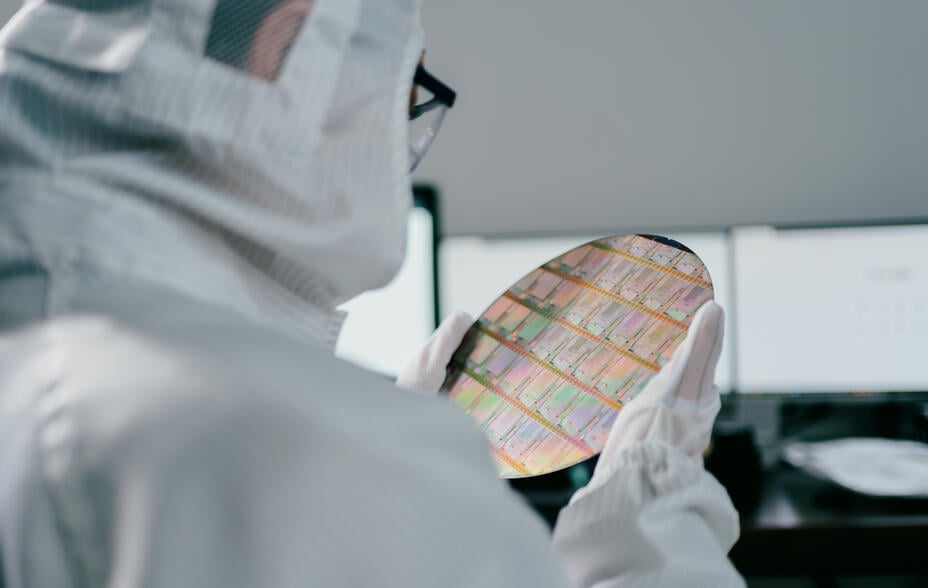
© Getty Images.
Capital at risk.
Despite these developments, our outlook on ASML, Tokyo Electron, and TSMC has not changed. As we illustrate below, all three companies, to differing extents, control choke points in a very large, growing industry – making them compelling investments for the long term.
The Chinese semiconductor industry remains limited
As background, China is not currently globally competitive in either the production of advanced semiconductors or the equipment required to manufacture them. It remains highly reliant on imports, despite the stated goal of 70 percent self-sufficiency in semiconductor production by 2025.
While Chinese foundry company SMIC has managed to produce a 7nanometre chip for Huawei phones, most of China’s fabrication capacity is for mature nodes at 130 nm and above. Meanwhile, less than 100 miles across the South China Sea in Taiwan, TSMC is pursuing the mass production of 2nm chips.
Despite being nowhere near that its self-sufficiency goal (estimates have it at less than 25 per cent nine years after that pledge was made), China has not been perturbed and is stepping up its investment, largely to semi-cap equipment. This is where China’s self-sufficiency is the lowest and its reliance on the West and Japan is the highest.
FDPR headlines do not impact investment case
By floating a potential extension of FDPR, the US seems to be attempting to lobby the Dutch and Japanese governments to go further in restricting the export of key pieces of technology to China. The Dutch government already prevents the sale of ASML’s most advanced EUV lithography systems to China. Japan also has restrictions on the export of certain pieces of semi-cap equipment, although these are less explicitly focused on China.
At this point, the talk of additional restrictions is pure conjecture, and the news stories are thin on detail.
There is a bear case scenario where this restriction is the start of a series of announcements around further restrictions, which lead to a surprise drop in sales to the Chinese market in the medium term or prompts more successful made-in-China policies in the semi-cap equipment industry.
However, there is also a scenario where this is only being suggested to persuade equipment manufacturers like ASML to cease servicing their machines in China, with minimal impact on sales and profits. In a more bullish case, these comments prompt even more aggressive build out of contingency production capacity in the US, Japan and Europe, leading to better-than-expected growth for semi-cap equipment manufacturers.
Looking further out into the future, we assume Western and Japanese semi-cap equipment companies will lose share in China given the country’s self-sufficiency drive. At the very least, we assume China will become a smaller part of these companies’ revenues due to increasing restrictions. But even if the recent surge in Chinese orders is temporary, the long-term opportunity remains extremely compelling.
Continued conviction in the industry
Supporting generative AI and the increasing computing requirements of a whole host of applications necessitates increased global investment in semi-cap equipment. Indeed, the access to and supply of chips has become a matter for sovereign governments outside of China, suggesting that spending on this equipment will ramp up. The US and EU both have chips acts committing spending and support for domestic semiconductor research and manufacturing, while the Japanese government has earmarked funds to support production on its islands.
Our current view is that our holdings will navigate such an environment and continue to grow their sales and profits alongside growing demand for semiconductors at ever more advanced nodes. The fact that further restrictions are being considered for these companies highlights how powerful they are in the global supply chain.
Increased production requires increasing levels of equipment and the number of equipment manufacturers across the whole value chain is small. These are concentrated markets, and both the barriers to entry and switching costs are incredibly high. For the most advanced chips, the likes of TSMC, Samsung and Intel require ASML’s cutting-edge EUV machines. This walks hand in hand with increased demand for Tokyo Electron’s coating equipment, as well as equipment for etching and cleaning. Meanwhile, TSMC is diversifying geographically by building plants in Germany, Japan, and the US to mitigate geopolitical risks and meet customer needs.
Risk factors
The views expressed should not be considered as advice or a recommendation to buy, sell or hold a particular investment. They reflect opinion and should not be taken as statements of fact nor should any reliance be placed on them when making investment decisions.
This communication was produced and approved in August 2024 and has not been updated subsequently. It represents views held at the time of writing and may not reflect current thinking.
Potential for profit and loss
All investment strategies have the potential for profit and loss, your or your clients’ capital may be at risk. Past performance is not a guide to future returns.
This communication contains information on investments which does not constitute independent research. Accordingly, it is not subject to the protections afforded to independent research, but is classified as advertising under Art 68 of the Financial Services Act (‘FinSA’) and Baillie Gifford and its staff may have dealt in the investments concerned.
All information is sourced from Baillie Gifford & Co and is current unless otherwise stated.
The images used in this communication are for illustrative purposes only.
Important information
Baillie Gifford & Co and Baillie Gifford & Co Limited are authorised and regulated by the Financial Conduct Authority (FCA). Baillie Gifford & Co Limited is an Authorised Corporate Director of OEICs.
Baillie Gifford Overseas Limited provides investment management and advisory services to non-UK Professional/Institutional clients only. Baillie Gifford Overseas Limited is wholly owned by Baillie Gifford & Co. Baillie Gifford & Co and Baillie Gifford Overseas Limited are authorised and regulated by the FCA in the UK.
Persons resident or domiciled outside the UK should consult with their professional advisers as to whether they require any governmental or other consents in order to enable them to invest, and with their tax advisers for advice relevant to their own particular circumstances.
Financial intermediaries
This communication is suitable for use of financial intermediaries. Financial intermediaries are solely responsible for any further distribution and Baillie Gifford takes no responsibility for the reliance on this document by any other person who did not receive this document directly from Baillie Gifford.
Europe
Baillie Gifford Investment Management (Europe) Ltd (BGE) is authorised by the Central Bank of Ireland as an AIFM under the AIFM Regulations and as a UCITS management company under the UCITS Regulation. BGE also has regulatory permissions to perform Individual Portfolio Management activities. BGE provides investment management and advisory services to European (excluding UK) segregated clients. BGE has been appointed as UCITS management company to the following UCITS umbrella company; Baillie Gifford Worldwide Funds plc. BGE is a wholly owned subsidiary of Baillie Gifford Overseas Limited, which is wholly owned by Baillie Gifford & Co. Baillie Gifford Overseas Limited and Baillie Gifford & Co are authorised and regulated in the UK by the Financial Conduct Authority.
South Korea
Baillie Gifford Overseas Limited is licensed with the Financial Services Commission in South Korea as a cross border Discretionary Investment Manager and Non-discretionary Investment Adviser.
Japan
Mitsubishi UFJ Baillie Gifford Asset Management Limited (‘MUBGAM’) is a joint venture company between Mitsubishi UFJ Trust & Banking Corporation and Baillie Gifford Overseas Limited. MUBGAM is authorised and regulated by the Financial Conduct Authority.
Australia
Baillie Gifford Overseas Limited (ARBN 118 567 178) is registered as a foreign company under the Corporations Act 2001 (Cth) and holds Foreign Australian Financial Services Licence No 528911. This material is provided to you on the basis that you are a “wholesale client” within the meaning of section 761G of the Corporations Act 2001 (Cth) (“Corporations Act”). Please advise Baillie Gifford Overseas Limited immediately if you are not a wholesale client. In no circumstances may this material be made available to a “retail client” within the meaning of section 761G of the Corporations Act.
This material contains general information only. It does not take into account any person’s objectives, financial situation or needs.
South Africa
Baillie Gifford Overseas Limited is registered as a Foreign Financial Services Provider with the Financial Sector Conduct Authority in South Africa.
North America
Baillie Gifford International LLC is wholly owned by Baillie Gifford Overseas Limited; it was formed in Delaware in 2005 and is registered with the SEC. It is the legal entity through which Baillie Gifford Overseas Limited provides client service and marketing functions in North America. Baillie Gifford Overseas Limited is registered with the SEC in the United States of America.
The Manager is not resident in Canada, its head office and principal place of business is in Edinburgh, Scotland. Baillie Gifford Overseas Limited is regulated in Canada as a portfolio manager and exempt market dealer with the Ontario Securities Commission (‘OSC’). Its portfolio manager licence is currently passported into Alberta, Quebec, Saskatchewan, Manitoba and Newfoundland & Labrador whereas the exempt market dealer licence is passported across all Canadian provinces and territories. Baillie Gifford International LLC is regulated by the OSC as an exempt market and its licence is passported across all Canadian provinces and territories. Baillie Gifford Investment Management (Europe) Limited (‘BGE’) relies on the International Investment Fund Manager Exemption in the provinces of Ontario and Quebec.
Israel
Baillie Gifford Overseas Limited is not licensed under Israel’s Regulation of Investment Advising, Investment Marketing and Portfolio Management Law, 5755–1995 (the Advice Law) and does not carry insurance pursuant to the Advice Law. This material is only intended for those categories of Israeli residents who are qualified clients listed on the First Addendum to the Advice Law.
109113 10048310




